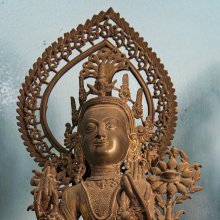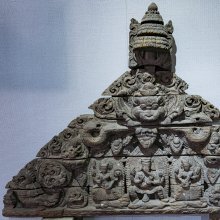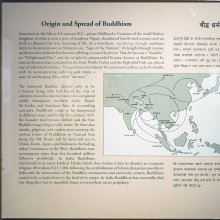Pranin, Prani, Prāṇī, Praṇī, Prāṇin: 31 definitions
Introduction:
Pranin means something in Buddhism, Pali, Hinduism, Sanskrit, Jainism, Prakrit, Marathi, Hindi. If you want to know the exact meaning, history, etymology or English translation of this term then check out the descriptions on this page. Add your comment or reference to a book if you want to contribute to this summary article.
Images (photo gallery)
In Hinduism
Shaktism (Shakta philosophy)
Source: Google Books: ManthanabhairavatantramPrāṇin (प्राणिन्) refers to “living beings”, according to the Śrīmatottara-tantra, an expansion of the Kubjikāmatatantra: the earliest popular and most authoritative Tantra of the Kubjikā cult.—Accordingly, as the God Bhairava said to the Goddess: “You are Power (śakti) and I am the individual soul called the vital breath (prāṇa) of living beings (prāṇin). The individual soul consists of Fire (i.e. power) and Air (breath) and is established in the Body of Kula [i.e., kulapiṇḍa]”.

Shakta (शाक्त, śākta) or Shaktism (śāktism) represents a tradition of Hinduism where the Goddess (Devi) is revered and worshipped. Shakta literature includes a range of scriptures, including various Agamas and Tantras, although its roots may be traced back to the Vedas.
Shaivism (Shaiva philosophy)
Source: Brill: Śaivism and the Tantric TraditionsPrāṇī (प्राणी) refers to “that which bestows (adhikāra)”, according to the Jayadrathayāmala, Ṣaṭka 1 verse 13.3–18::—Accordingly, “And that [initiation] is either a Samayadīkṣā or Nirvāṇādīkṣā, divided into two because it has two natures. Now the Samayadīkṣā is further twofold because of a difference in the result. [The first] bestows (prāṇī) adhikāra [and] follows the practices of jñāna and yoga, [the second] destroys the latent impressions (vāsana) of that [soul?] and bestows a state of eternal pervasion [with the deity]. [That is known] by the firm ones who know the Tantras. [...]
Source: SOAS University of London: Protective Rites in the Netra TantraPrāṇin (प्राणिन्) refers to “living beings”, according to the Netratantra of Kṣemarāja: a Śaiva text from the 9th century in which Śiva (Bhairava) teaches Pārvatī topics such as metaphysics, cosmology, and soteriology.—Accordingly, [verse 22.14]—“Oṃ (praṇava) exists as the vital energy [i.e., life] (prāṇa) of living beings (prāṇin). It is established as that which keeps [living beings] alive. Praṇava enables [those beings] with all [their] parts. He [who knows this] shall know Śiva”.

Shaiva (शैव, śaiva) or Shaivism (śaivism) represents a tradition of Hinduism worshiping Shiva as the supreme being. Closely related to Shaktism, Shaiva literature includes a range of scriptures, including Tantras, while the root of this tradition may be traced back to the ancient Vedas.
Vastushastra (architecture)
Source: Brill: Śaivism and the Tantric Traditions (architecture)Prāṇin (प्राणिन्) refers to a “creature”, according to the Devyāmata (in the section śalyoddhāra-paṭala or “excavation of extraneous substances”).—Accordingly, “[...] If a creature [intrudes into the site] stepping over [a cord], then [the officiant] should know that there is the body [of that creature, i.e. bones of that creature beneath the site] (prāṇin—anyasya prāṇino'pyaṅgaṃ). He should prognosticate an extraneous substance beneath the site by the bad condition of the householder’s body. If an omen is seen, or if [a creature] cries out, or if [someone] announces a [creature’s] name, then [the officiant] should prognosticate an extraneous thing [related to] that [creature]”.

Vastushastra (वास्तुशास्त्र, vāstuśāstra) refers to the ancient Indian science (shastra) of architecture (vastu), dealing with topics such architecture, sculpture, town-building, fort building and various other constructions. Vastu also deals with the philosophy of the architectural relation with the cosmic universe.
Sports, Arts and Entertainment (wordly enjoyments)
Source: archive.org: Syainika Sastra of Rudradeva with English Translation (art)Prāṇin (प्राणिन्) refers to “animals”, according to the Śyainika-śāstra: a Sanskrit treatise dealing with the divisions and benefits of Hunting and Hawking, written by Rājā Rudradeva (or Candradeva) in possibly the 13th century.—Accordingly, “The killing of animals (prāṇin) leads to a series of sins. Sacrificial animals are said to be fourteen in number. Some are domestic, others wild. The slaughter of these animals, if not sprinkled aver with water for sacrificial purposes, is a sin. [...]”.

This section covers the skills and profiencies of the Kalas (“performing arts”) and Shastras (“sciences”) involving ancient Indian traditions of sports, games, arts, entertainment, love-making and other means of wordly enjoyments. Traditionally these topics were dealt with in Sanskrit treatises explaing the philosophy and the justification of enjoying the pleasures of the senses.
In Buddhism
Mahayana (major branch of Buddhism)
Source: academia.edu: A Study and Translation of the GaganagañjaparipṛcchāPrāṇin (प्राणिन्) refers to “(various other) beings”, according to the Gaganagañjaparipṛcchā: the eighth chapter of the Mahāsaṃnipāta (a collection of Mahāyāna Buddhist Sūtras).—Accordingly, “When this decisive teaching was declared, seventy-two millions of Gods, Humans, Asuras, Kiṃnaras, Mahoragas, and other beings (prāṇin) produced the thought of incomparable complete awakening, thirty-two thousand Bodhisattvas attained the tolerance that all things are unborn, this world system of three thousandfold worlds was shaken in its six ways, and the world was illuminated by a grand lustre.. [...]”.
Source: De Gruyter: A Buddhist Ritual Manual on AgriculturePrāṇin (प्राणिन्) refers to a “(living) beings”, according to the Vajratuṇḍasamayakalparāja, an ancient Buddhist ritual manual on agriculture from the 5th-century (or earlier), containing various instructions for the Sangha to provide agriculture-related services to laypeople including rain-making, weather control and crop protection.—Accordingly, [after Sāgara inquired the Bhagavān on his emitting of rays], “The Bhagavān said, ‘Listen Serpent chief. Many hundred thousand beings (prāṇi-śatasahasra) are obstructed by life-obstruction’. Then Sāgara, the great Nāga king, filled the lotus lake with rain showers in a moment, an instant, a short time and refreshed [it]”.

Mahayana (महायान, mahāyāna) is a major branch of Buddhism focusing on the path of a Bodhisattva (spiritual aspirants/ enlightened beings). Extant literature is vast and primarely composed in the Sanskrit language. There are many sūtras of which some of the earliest are the various Prajñāpāramitā sūtras.
Tibetan Buddhism (Vajrayana or tantric Buddhism)
Source: OSU Press: Cakrasamvara SamadhiPrāṇin (प्राणिन्) or Sattvaprāṇin refers to “living beings”, according to the Guru Mandala Worship (maṇḍalārcana) ritual often performed in combination with the Cakrasaṃvara Samādhi, which refers to the primary pūjā and sādhanā practice of Newah Mahāyāna-Vajrayāna Buddhists in Nepal.—Accordingly, “[etat puṇyena sarvasattva-prāṇibhyaḥ uddhāra-kāmanārthaṃ ante anuttarāya samyaksambodhi-jñāna-phalaprāpti-kāmanārthaṃ]—By this merit, for the elevation of the lives of all beings, (and) in the end, For the best, the success of the knowledge of complete enlightenment”.

Tibetan Buddhism includes schools such as Nyingma, Kadampa, Kagyu and Gelug. Their primary canon of literature is divided in two broad categories: The Kangyur, which consists of Buddha’s words, and the Tengyur, which includes commentaries from various sources. Esotericism and tantra techniques (vajrayāna) are collected indepently.
In Jainism
General definition (in Jainism)
Source: The University of Sydney: A study of the Twelve ReflectionsPrāṇin (प्राणिन्) (Cf. Bhūta) refers to “sentient beings”, according to the commentary on the 11th century Jñānārṇava (verse 2.2), a treatise on Jain Yoga in roughly 2200 Sanskrit verses composed by Śubhacandra.—Accordingly, “Brother, deceived by living beings [com.—prāṇin—prāṇibhiḥ—‘by sentient beings’], you do not obtain happiness, you do not contemplate your own true nature , you do not perceive the sorrow of life”.
Synonyms: Dehin, Aṅgin.
Source: SOAS Research Online: Prekṣā meditation: History and MethodsPrāṇī (प्राणी) refers to “those having a vital force”; as opposed to Aprāṇī—“being devoid of vital force” which refers to one of the 46 qualities of the soul to be meditated on in the “Practice of Meditation on Liberated Souls (Siddhas)”, according to Jain texts like Ācārāṅga (5.6.123-140), Ṣaṭkhaṇḍāgama (13.5.4.31) and Samayasāra (1.49).—The pure soul can be recognised by meditation on its true nature, represented by the liberated souls of the Siddhas. [...] The qualities of the soul to be meditated on as truly mine are: [e.g., My soul is devoid of vital force (a-prāṇī)] [...] The meditation on such extended fourty-five qualities of the pure soul presents the niśacaya-naya, which is aligned with Kundakunda’s approach.

Jainism is an Indian religion of Dharma whose doctrine revolves around harmlessness (ahimsa) towards every living being. The two major branches (Digambara and Svetambara) of Jainism stimulate self-control (or, shramana, ‘self-reliance’) and spiritual development through a path of peace for the soul to progess to the ultimate goal.
Languages of India and abroad
Marathi-English dictionary
Source: DDSA: The Molesworth Marathi and English DictionaryPrāṇī (प्राणी).—m (S) An animal in general; any living creature.
Source: DDSA: The Aryabhusan school dictionary, Marathi-EnglishPrāṇī (प्राणी).—m An animal in general.
Marathi is an Indo-European language having over 70 million native speakers people in (predominantly) Maharashtra India. Marathi, like many other Indo-Aryan languages, evolved from early forms of Prakrit, which itself is a subset of Sanskrit, one of the most ancient languages of the world.
Sanskrit dictionary
Source: DDSA: The practical Sanskrit-English dictionaryPraṇī (प्रणी).—1 P.
1) To lead or forth (as an army), conduct; वानरेन्द्रेण प्रणीतेन (vānarendreṇa praṇītena) (balena) Rām.
2) To offer, give, present; अर्घ्यं प्रणीय जनकात्मजा (arghyaṃ praṇīya janakātmajā) Bhaṭṭikāvya 5.76.
3) To bring to, set (as fire); दग्धां गुहां पश्य उलूकपूर्णां काकप्रणीतेन हुताशनेन (dagdhāṃ guhāṃ paśya ulūkapūrṇāṃ kākapraṇītena hutāśanena) Pañcatantra (Bombay) 3.1.
4) To consecrate by reciting sacred Mantras, hallow, consecrate in general; त्रिधा प्रणीतो ज्वलनः (tridhā praṇīto jvalanaḥ) Hariv.
5) To inflict (as punishment); यदि न प्रणयेद् राजा दण्डं दण्ड्येष्वतन्द्रितः (yadi na praṇayed rājā daṇḍaṃ daṇḍyeṣvatandritaḥ) Manusmṛti 7.2;8.238; Mahābhārata (Bombay) 1.64.15.
6) To lay down, teach, promulgate, institute, prescribe; स एव धर्मो मनुना प्रणीतः (sa eva dharmo manunā praṇītaḥ) R.14.67; भवत्प्रणीतमाचारमामनन्ति हि साधवः (bhavatpraṇītamācāramāmananti hi sādhavaḥ) Kumārasambhava 6.31.
7) To write, compose (as a work); प्रणीतः न तु प्रकाशितः (praṇītaḥ na tu prakāśitaḥ) Uttararāmacarita 4; उत्तरं रामचरितं तत्प्रणीतं प्रयुज्यते (uttaraṃ rāmacaritaṃ tatpraṇītaṃ prayujyate) Uttararāmacarita 1.3.
8) To accomplish, effect, perform, bring about; प्रणीय दारिद्र्यदरिद्रतां नृपः (praṇīya dāridryadaridratāṃ nṛpaḥ) N.1.15.19; कण्ठाश्लेषोपगूढं तदपि च न चिरं यत् प्रियाभिः प्रणीतम् (kaṇṭhāśleṣopagūḍhaṃ tadapi ca na ciraṃ yat priyābhiḥ praṇītam) Bhartṛhari 3.82.
9) To lead or reduce to any condition.
1) To show, display; यद्यद्धिया त उरुगाय विभावयन्ति तत्तद्वपुः प्रणयसे सदनुग्रहाय (yadyaddhiyā ta urugāya vibhāvayanti tattadvapuḥ praṇayase sadanugrahāya) Bhāgavata 3.9.11.
11) To direct, fix or turn towards (as the eyes).
12) To show affection or love, love.
13) To throw, cast, discharge; अस्त्रं पुनः पाशमृतः प्रणिन्ये (astraṃ punaḥ pāśamṛtaḥ praṇinye) Kirātārjunīya 16.54.
14) To remove, destroy; द्रौपद्याश्च परिक्लेशं प्रणेष्यामि हते त्वयि (draupadyāśca parikleśaṃ praṇeṣyāmi hate tvayi) Mahābhārata (Bombay) 6.79.4.
15) To draw in the breath (Ātm.).
--- OR ---
Praṇī (प्रणी).—a. maker, fashioner; सायंतनीं तिथिप्रण्यः (sāyaṃtanīṃ tithipraṇyaḥ); Bhaṭṭikāvya 5.65. (tithipraṇī the moon.)
Source: DDSA: The practical Sanskrit-English dictionaryPrāṇin (प्राणिन्).—n. Breathing, living, alive. -m.
1) A living or sentient being, a living creature; यया प्राणिनः प्राणवन्तः (yayā prāṇinaḥ prāṇavantaḥ) Ś.1.1; Meghadūta 5.
2) A man, power, vigour; देवस्त्रियो रसां नातीः प्राणिभिः पुनराहरत् (devastriyo rasāṃ nātīḥ prāṇibhiḥ punarāharat) Bhāgavata 9.2.31.
Source: Cologne Digital Sanskrit Dictionaries: Shabda-Sagara Sanskrit-English DictionaryPrāṇin (प्राणिन्).—mfn. (-ṇī-ṇinī-ṇi) Living, breathing. m. (-ṇī) An animal, a sentient or living being. E. prāṇa vital air, and ini aff.
Source: Cologne Digital Sanskrit Dictionaries: Benfey Sanskrit-English DictionaryPrāṇin (प्राणिन्).—i. e. prāṇa + in, adj. sbst., f. nī, Living, a living being, [Mānavadharmaśāstra] 4, 117, [Pañcatantra] iii. [distich] 140.
Source: Cologne Digital Sanskrit Dictionaries: Cappeller Sanskrit-English DictionaryPraṇī (प्रणी).—[masculine] guide, [feminine] guidance.
--- OR ---
Pranī (प्रनी).—bring forwards, lead further, promote; convey ([ritual or religion]); conduct or take to ([Middle] to one’s self), present, offer; bring or reduce to (a state); employ, inflict (punishment); state, decide, teach, compose, promulgate; perform, accomplish; show, betray ([especially] one’s feelings), love, desire.
Pranī is a Sanskrit compound consisting of the terms pra and nī (नी).
Source: Cologne Digital Sanskrit Dictionaries: Cappeller Sanskrit-English DictionaryPrāṇin (प्राणिन्).—[adjective] having breath or life; [masculine] living creature, man or animal.
Source: Cologne Digital Sanskrit Dictionaries: Monier-Williams Sanskrit-English Dictionary1) Praṇi (प्रणि):—[=pra-ṇi] for pra-ni, according to, [Pāṇini 8-4, 17] before a number of roots, viz. gad (See below), ci, 1. dā, dih, de, do, drā, dhā (See below), dhe, nad (See below), pat (See below), pad, psāmā, me, yam, yā, vap, vah, vā, śam, so, han (See below)
2) [v.s. ...] according to, [Vopadeva xii, 1] also before 1 mi.
3) Praṇī (प्रणी):—[=pra-ṇī] a (√nī) [Parasmaipada] [Ātmanepada] -ṇayati, te to lead forwards, conduct, advance, promote, further, [Ṛg-veda] etc. etc.;
—to bring or lead to, convey ([especially] the sacrificial fire or water or Soma to its place at the altar), [ib.];
—to offer, present, [Bhaṭṭi-kāvya];
—to produce, perform, execute, finish, [Upaniṣad; Mahābhārata; Kāvya literature] etc.;
—to do away with, remove, dispel, [Mahābhārata];
—to manifest affection, love, desire, [Mahābhārata];
—to show, represent (a drama), [Bālarāmāyaṇa; Prasannarāghava];
—to inflict (as punishment), [Manu-smṛti; Mahābhārata] etc.;
—to apply (as a clyster), [Caraka];
—to establish, fix, institute, promulgate, teach, [Mahābhārata; Kāvya literature] etc.;
—to write, compose, [Sarvadarśana-saṃgraha];—([Ātmanepada]) to draw in (the breath), [Śatapatha-brāhmaṇa] :
—[Desiderative] -ninīṣati (!), to wish to lead or conduct, [Ṛg-veda]
4) [=pra-ṇī] b m. a leader or guide, [Taittirīya-brāhmaṇa]
5) [v.s. ...] f. guidance, furtherance, devotion (?), [Ṛg-veda iii, 38, 2.]
6) Prāṇi (प्राणि):—[from prān] in [compound] for prāṇin.
Source: Cologne Digital Sanskrit Dictionaries: Monier-Williams Sanskrit-English Dictionary1) Prāṇin (प्राणिन्):—[from prān] mfn. breathing, living, alive
2) [v.s. ...] m. a living or sentient being, living creature, animal or man, [Śatapatha-brāhmaṇa] etc., etc. (also n., [Āpastamba-śrauta-sūtra])
Source: Cologne Digital Sanskrit Dictionaries: Yates Sanskrit-English DictionaryPraṇi (प्रणि):—pāta (taḥ) 1. m. Salutation.
Source: Cologne Digital Sanskrit Dictionaries: Yates Sanskrit-English DictionaryPrāṇin (प्राणिन्):—(ṇī) 5. m. Sentinet being, an animal. a. Breathing, living.
Source: DDSA: Paia-sadda-mahannavo; a comprehensive Prakrit Hindi dictionary (S)Praṇī (प्रणी) in the Sanskrit language is related to the Prakrit word: Paṇaya.
Source: DDSA: Paia-sadda-mahannavo; a comprehensive Prakrit Hindi dictionary (S)Prāṇin (प्राणिन्) in the Sanskrit language is related to the Prakrit word: Pāṇi.
[Sanskrit to German]
Sanskrit, also spelled संस्कृतम् (saṃskṛtam), is an ancient language of India commonly seen as the grandmother of the Indo-European language family (even English!). Closely allied with Prakrit and Pali, Sanskrit is more exhaustive in both grammar and terms and has the most extensive collection of literature in the world, greatly surpassing its sister-languages Greek and Latin.
Hindi dictionary
Source: DDSA: A practical Hindi-English dictionary1) Prāṇi (प्राणि):——an allomorph of [prāṇī; ~jagata] the animal world/kingdom; the world of living beings; animal life; ~[vijñāna] Zoology; ~[vaijñānika] a zoologist; zoological; —[hiṃsā] killing of or violence towards living beings.
2) Prāṇī (प्राणी):—: (nm) a living being, living organism, a creature; an animal.
...
Kannada-English dictionary
Source: Alar: Kannada-English corpusPrāṇi (ಪ್ರಾಣಿ):—
1) [noun] any living organism, excluding plants; an animal.
2) [noun] any such organism other than a human being; an animal.
3) [noun] (derog. or compassionate term) a human being.
Kannada is a Dravidian language (as opposed to the Indo-European language family) mainly spoken in the southwestern region of India.
Nepali dictionary
Source: unoes: Nepali-English DictionaryPrāṇī (प्राणी):—n. living creatures; animate being; animal;
Nepali is the primary language of the Nepalese people counting almost 20 million native speakers. The country of Nepal is situated in the Himalaya mountain range to the north of India.
See also (Relevant definitions)
Starts with: Pranidyuta, Pranigana, Pranihimsa, Pranihita, Pranijata, Pranina, Praninad, Praninada, Praninadat, Pranind, Pranindana, Praninishenya, Praninishu, Praniniya, Pranipida, Pranishatasahasra, Pranyanga.
Ends with: Antahpranin, Apranin, Himsapranin, Sarvapranin, Sattvapranin.
Full-text (+187): Pranipida, Pranighatana, Paṇaya, Pranidyuta, Dinaprani, Pranihita, Hitaprani, Pranihimsa, Pani, Shuciprani, Pranipatana, Pranighatin, Pranijata, Pranidhana, Pranimata, Himsapranipracura, Pranayaka, Pranyanga, Pranijna, Pranidhi.
Relevant text
Search found 21 books and stories containing Pranin, Prani, Prāṇī, Praṇī, Prāṇin, Pranī, Pra-ni, Pra-nī, Praṇi, Pra-ṇi, Pra-ṇī, Prāṇi, Praani; (plurals include: Pranins, Pranis, Prāṇīs, Praṇīs, Prāṇins, Pranīs, nis, nīs, Praṇis, ṇis, ṇīs, Prāṇis, Praanis). You can also click to the full overview containing English textual excerpts. Below are direct links for the most relevant articles:
Garga Samhita (English) (by Danavir Goswami)
Verse 1.15.28 < [Chapter 15 - Revelation of the Universal Form to Nanda’s Wife]
Chaitanya Bhagavata (by Bhumipati Dāsa)
Verse 2.23.327 < [Chapter 23 - Wandering about Navadvīpa On the Day the Lord Delivered the Kazi]
Verse 1.16.174 < [Chapter 16 - The Glories of Śrī Haridāsa Ṭhākura]
Verse 1.16.287 < [Chapter 16 - The Glories of Śrī Haridāsa Ṭhākura]
Rig Veda (translation and commentary) (by H. H. Wilson)
Bhakti-rasamrta-sindhu (by Śrīla Rūpa Gosvāmī)
Verse 2.4.76 < [Part 4 - Transient Ecstatic Disturbances (vyābhicāri-bhāva)]
Maha Prajnaparamita Sastra (by Gelongma Karma Migme Chödrön)
II. Degrees of Loving-kindness and Compassion < [Chapter XLII - The Great Loving-kindness and the Great Compassion of the Buddhas]
Part 1 - Required conditions for murder < [Section I.1 - Abstaining from murder]


